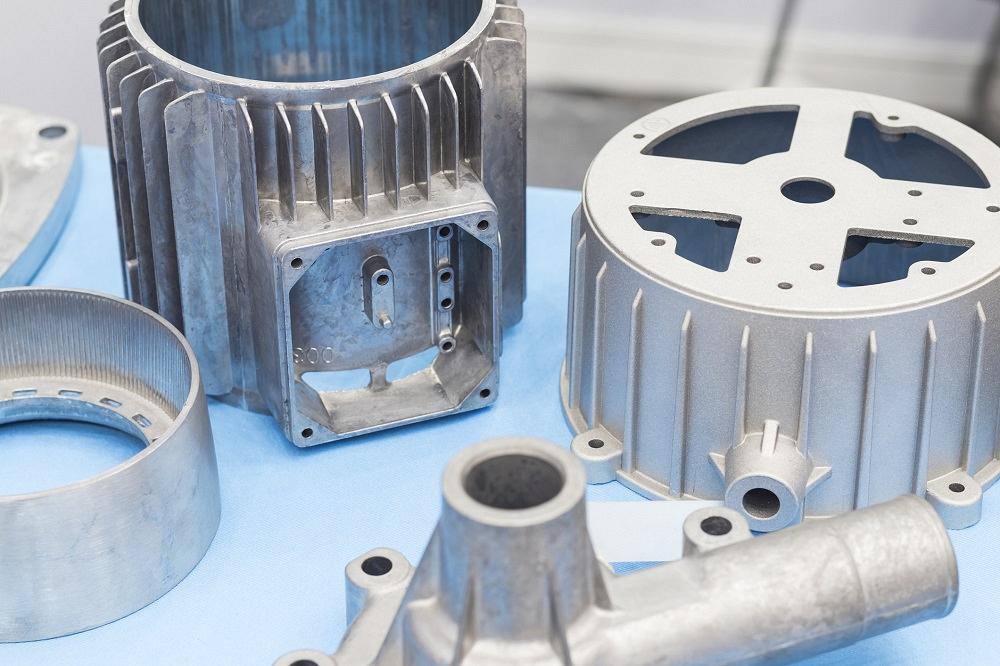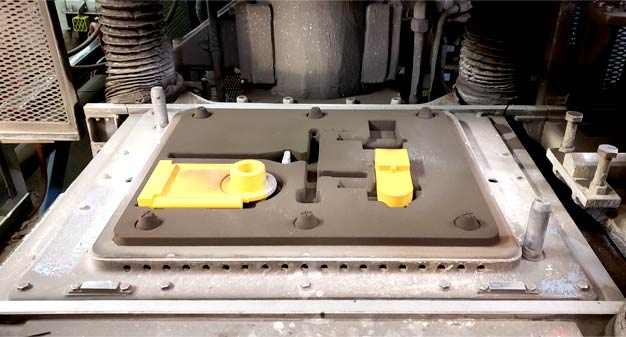Why many industries trust Precision aluminum casting for high-quality components
How Light Weight Aluminum Foundries Add To Different Industries: A Comprehensive Review
Light weight aluminum foundries work as necessary suppliers across multiple markets, including automotive, aerospace, building, and electronics. They generate elements that are not only light-weight however also sturdy, enhancing the performance of numerous items. With innovative spreading strategies and a commitment to sustainability, these shops are adjusting to fulfill progressing industry needs. As they innovate, the effect of aluminum castings on various applications elevates vital questions about the future of production. What exists ahead for this essential market?
The Function of Aluminum Foundries in the Automotive Market
As the vehicle industry increasingly accepts light-weight products to improve gas performance and performance, aluminum foundries play an important role in this development. These centers concentrate on the manufacturing of aluminum castings, which are essential elements in modern vehicles. By providing high-strength, lightweight components, aluminum foundries make it possible for manufacturers to minimize the overall weight of vehicles, ultimately bring about enhanced fuel economic situation and decreased discharges.
Aluminum's resistance to corrosion better boosts car longevity, making it an appealing option for automakers. Factories make use of innovative methods such as die casting and sand casting to develop precise and complex elements, guaranteeing that they meet rigorous sector criteria. Additionally, the capability to recycle light weight aluminum efficiently adds to a much more lasting production process. As the auto sector remains to introduce, light weight aluminum factories will certainly stay crucial in delivering the materials needed for the following generation of automobiles, sustaining both performance and environmental objectives.

Aerospace Applications of Light Weight Aluminum Castings
Light weight aluminum castings are important to the aerospace sector, supplying a combination of light-weight stamina and durability that is essential for aircraft efficiency. These castings are made use of in various components, such as engine components, architectural frames, and touchdown gear, where weight reduction is crucial for fuel efficiency and general safety. The adaptability of aluminum enables for intricate geometries that improve wind resistant performance while preserving structural stability.
In addition, developments in casting technologies have actually enhanced the precision and surface finish of light weight aluminum parts, lowering the need for extensive post-processing. This performance not only accelerates manufacturing timelines but likewise decreases prices, making aluminum an eye-catching choice for producers. The deterioration resistance of light weight aluminum assurances longevity and dependability in harsh operating environments, additionally developing its role in aerospace applications. As the sector advances, aluminum spreadings continue to be a vital product, driving advancement and sustaining the growth of next-generation airplane.
Building And Construction Industry Developments Via Aluminum
The construction market has actually progressively embraced light weight aluminum because of its lightweight residential properties and versatility, paralleling its successful applications in aerospace. Innovations in light weight aluminum design have led to more powerful, much more reliable frameworks, allowing designers and home builders to explore brand-new opportunities. The product's resistance to deterioration and reduced upkeep needs make it particularly appealing for both business and domestic projects.
Light weight aluminum's convenience promotes the creation of elaborate designs, permitting aesthetic enhancements that were previously tough with conventional products. Prefabrication methods have actually additionally evolved, making use of aluminum to lower building time and prices considerably. Furthermore, the energy effectiveness of light weight aluminum systems-- such as window structures and roofing-- adds to lasting building techniques, lining up with contemporary environmental criteria. As the building sector continues to welcome these innovations, aluminum's function is expected to broaden, driving more innovation and contributing to the development of resilient facilities.
Electronic devices and the Demand for Lightweight Aluminum Parts
With the rapid advancement of innovation, the need for light-weight light weight aluminum components in the electronics industry has surged. As tools come to be extra small and mobile, makers look for materials that use both durability and weight decrease. Aluminum, with its excellent strength-to-weight proportion, has become a preferred selection for components such as coverings, heat sinks, and architectural supports.
Making use of aluminum not only enhances item performance but likewise adds to power effectiveness, as lighter gadgets require less power during operation. Furthermore, light weight aluminum's superb conductivity makes it excellent for electronic applications, ensuring effective heat dissipation and reducing the threat of overheating.
As consumer choices change in the direction of lightweight and sleek gizmos, aluminum foundries play a vital duty in satisfying the advancing needs of the electronic devices market (Aluminum Casting Company). Their ability to create specific and premium aluminum parts sustains development, making it possible for producers to press the boundaries of design and capability
Sustainable Practices in Aluminum Foundries
As the electronic devices industry increasingly focuses on sustainability, light weight aluminum foundries are adapting their methods to align with these environmental objectives. Lots of shops are executing reusing programs that reclaim light weight aluminum scrap, substantially minimizing the need for resources and decreasing waste. By making use of energy-efficient technologies, these centers are reducing their carbon impact; for instance, using electric furnaces as opposed to standard gas-fired ones can cause significant energy financial savings.
Furthermore, aluminum shops are purchasing water preservation procedures, such as closed-loop systems that reuse water made use of in cooling processes. These techniques not only lower water intake yet additionally reduce the ecological effect related to wastewater discharge. Many shops are discovering sustainable power sources, such as solar and wind power, to fulfill their power requires sustainably. Via these initiatives, aluminum shops exhibit a commitment to environmental stewardship while proceeding to meet the needs of the electronic devices market.
Future Patterns in Light Weight Aluminum Foundry Technologies
Emerging innovations are poised to change light weight aluminum factories, boosting effectiveness and item top quality while progressing sustainability initiatives. Developments such as man-made intelligence and that site maker discovering are expected to maximize manufacturing processes by anticipating tools failings and improving resource appropriation. The combination of innovative robotics will streamline operations, minimizing labor costs and lessening human mistake.
Additive production, or 3D printing, is additionally obtaining grip, enabling the production of intricate geometries that were previously unattainable with typical techniques. This shift might lead to significant product financial savings and minimized waste. Furthermore, clever shops making use of IoT (Web of Points) modern technologies will enable real-time monitoring and data evaluation, fostering aggressive decision-making.
The adoption of cleaner melting modern technologies and reusing methods will certainly even more lower the ecological impact of light weight aluminum foundries, making them extra lasting. Jointly, these fads signify a future where light weight aluminum factories can run with greater efficiency and duty.
Regularly Asked Questions
What Are the Ecological Impacts of Aluminum Foundries?

Exactly How Do Foundries Make Sure High Quality Control in Aluminum Casting?
Factories ensure quality assurance in aluminum spreading by carrying out strenuous inspection procedures, using sophisticated innovation, performing regular material screening, and sticking to sector standards, therefore maintaining uniformity and dependability in their finished items. aluminum casting.
What Is the Average Lifespan of Light Weight Aluminum Cast Components?
The typical life expectancy of aluminum actors components commonly ranges from 10 to half a century, relying on elements such as ecological problems, usage, and upkeep. Appropriate care can significantly improve their sturdiness and efficiency in time.
Exactly How Are Light Weight Aluminum Alloys Selected for Details Applications?
Aluminum alloys are picked based upon factors such as toughness, rust resistance, weight, and thermal conductivity. Designers review the particular requirements of applications to figure out the most appropriate alloy for best efficiency and toughness.
What Are the Safety And Security Regulations for Aluminum Shop Employees?
Security policies for light weight aluminum factory employees consist of personal safety equipment mandates, ventilation requirements, exposure limitations to unsafe products, and methods for handling liquified metal. Compliance assurances worker safety and security and decreases wellness threats linked with foundry procedures.
As the auto industry significantly welcomes lightweight products to boost gas effectiveness and efficiency, aluminum foundries play a critical duty in this evolution. As consumer preferences change in the direction of lightweight and smooth gizmos, light weight aluminum foundries play a necessary role in satisfying the advancing needs of the electronics industry. As the electronic devices industry progressively prioritizes sustainability, anonymous light weight aluminum factories are adjusting their methods to line up with these ecological goals. Several shops are executing get more recycling programs that reclaim aluminum scrap, substantially reducing the requirement for raw materials and lessening waste. Security policies for aluminum foundry workers consist of individual protective equipment mandates, air flow requirements, direct exposure restrictions to hazardous materials, and procedures for taking care of liquified steel.